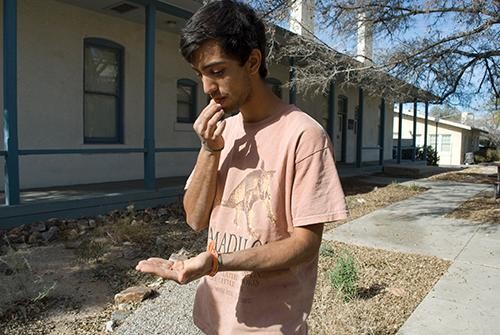UA students put together a demonstration garden a little more than a year ago, and both the project and the number of students involved have grown since its inception.
A Students for Sustainability team called Garden in the Desert created the One Tree Garden, located at the Udall Center for Studies in Public Policy. The garden is named for the netleaf hackberry tree that sits at the garden’s center.
“”We aren’t really a committee anymore, we’re a community,”” said Caleb Weaver, Garden in the Desert co-manager and a senior majoring in ecology and evolutionary biology and geosciences.
Through working together, the group has become close. They regularly hang out at the gardens of team members and go to different events together.
During winter break, the garden was left fallow because no one would be around to tend to it. Prior to leaving, they harvested basil, arugula, watermelons, garbanzo beans and beets. Often the students eat the food as a group because they like to throw potlucks.
Weaver and his fellow co-manger Andre Luiz Domingues, a sophomore majoring in geography and Latin American studies, said learning how to grow food in the desert has been a very different experience since they both come from the East Coast.
Domingues said they use a lot of Native American agricultural techniques, such as creating sunken beds in order to catch water.
The group also uses passive rainwater harvesting to prevent water from running onto Euclid Avenue and causing erosion. The harvesting technique allows them to plant near the street without using extra water.
In addition to learning about gardening and rainwater harvesting, Weaver said he has learned a lot about the business side.
“”We’ve really learned how to network,”” Weaver said, adding that he has also learned how to work around red tape. “”It’s important to learn how to deal with that aspect.””
The group just finished writing a 25-page proposal to create a second garden that would be much larger.
The new garden would allow students and community members to grow their own crops, most likely for a monthly fee. The group also plans to grow crops there that they can sell to students.
With a candidate for the new garden on campus in mind, the group members hope to begin digging soon. As far as what the garden can offer students and community members, Weaver and Domingues agree it helps people be more in tune with what they eat.
“”I didn’t have much of a connection with the food I ate … gardening when you see the whole process … you grow a lot of appreciation for what you eat and you also start eating more healthily,”” Domingues said. “”It’s given me more of a connection to my foods and to the land I live on and my consumption habits.””









